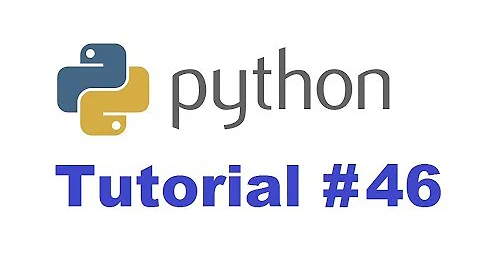Python: How can I enable use of kwargs when calling from command line? (perhaps with argparse)
Solution 1
If you want to pass in keyword arguments as you would in the main function, key=value, you can do it like so:
import sys
def main(foo, bar, *args):
print "Called my script with"
print "foo = %s" % foo
print "bar = %s" % bar
for arg in args:
k = arg.split("=")[0]
v = arg.split("=")[1]
print "Keyword argument: %s = %s" % (k, v)
if __name__ == "__main__":
if len(sys.argv) < 3:
raise SyntaxError("Insufficient arguments.")
if len(sys.argv) != 3:
# If there are keyword arguments
main(sys.argv[1], sys.argv[2], *sys.argv[3:])
else:
# If there are no keyword arguments
main(sys.argv[1], sys.argv[2])
Some examples:
$> python my_file.py a b x=4
Called my script with
foo = a
bar = b
Keyword argument: x = 4
$> python my_file.py foo bar key=value
Called my script with
foo = foo
bar = bar
Keyword argument: key = value
However, this assumes that the key and value do not have any whitespace between them, key = value will not work.
If you are looking for --argument kinds of keyword arguments, you should use argparse.
Solution 2
@Moon beat me to it with a similar solution, but I'd suggest doing the parsing beforehand and passing in actual kwargs:
import sys
def main(foo, bar, **kwargs):
print('Called myscript with:')
print('foo = {}'.format(foo))
print('bar = {}'.format(bar))
for k, v in kwargs.items():
print('keyword argument: {} = {}'.format(k, v))
if __name__=='__main__':
main(sys.argv[1], # foo
sys.argv[2], # bar
**dict(arg.split('=') for arg in sys.argv[3:])) # kwargs
# Example use:
# $ python myscript.py foo bar hello=world 'with spaces'='a value'
# Called myscript with:
# foo = foo
# bar = bar
# keyword argument: hello = world
# keyword argument: with spaces = a value
Solution 3
First, you won't be passing an arbitrary Python expression as an argument. It's brittle and unsafe.
To set up the argument parser, you define the arguments you want, then parse them to produce a Namespace object that contains the information specified by the command line call.
import argparse
p = argparse.ArgumentParser()
p.add_argument('foo')
p.add_argument('bar')
p.add_argument('--add-feature-a', dest='a', action='store_true', default=False)
In your __main__ block, you'll parse the arguments, then pass a dictionary produced from the Namespace to main.
if __name__ == '__main__':
args = p.parse_args()
main(**vars(args))
Then you'll call your script with a line like
# foo = "3", bar = "6", a = True
python myscript.py 3 6 --add-feature-a
or
# foo = "moo", bar="7.7", a = False
python myscript.py moo 7.7
There's a lot more you can do with argparse, but this is a simple example for getting the value it produces into main.
Solution 4
in two lines of code I can get args and kwargs that I can manipulate like standard args and kwargs:
import sys
if __name__=='__main__':
argv=argv[1:]
kwargs={kw[0]:kw[1] for kw in [ar.split('=') for ar in argv if ar.find('=')>0]}
args=[arg for arg in argv if arg.find('=')<0]
#and you can the use args and kwargs as so:
if 'reset' in args:
do_some_functions_with_reset()
a_device_var=kwargs.get('device',False):
#or whatever you want to do with args and kwargs
and the result is :
$python test.py reset device=foo format=1 bar
->args=['reset','bar']
->kwargs={'device':'foo','format':'1'}
Related videos on Youtube
Dr. John A Zoidberg
Updated on July 09, 2022Comments
-
 Dr. John A Zoidberg almost 2 years
Dr. John A Zoidberg almost 2 yearssuppose I have the module myscript.py; This module is production code, and is called often as
%dir%>python myscript.py foo bar.I want to extend it to take keyword arguments. I know that I can take these arguments using the script below, but unfortunately one would have to call it using
%dir%>python myscript.py main(foo, bar).I know that I can use the
argparsemodule, but I'm not sure how to do it.import sys def main(foo,bar,**kwargs): print 'Called myscript with:' print 'foo = %s' % foo print 'bar = %s' % bar if kwargs: for k in kwargs.keys(): print 'keyword argument : %s' % k + ' = ' + '%s' % kwargs[k] if __name__=="__main__": exec(''.join(sys.argv[1:]))-
Ian almost 8 yearsYou already seem to have provided the solution but want us to write the program for you. How about you first go to the documentation, try something and post again when you get stuck trying
argparse. -
 Moon Cheesez almost 8 yearsI don't think there is a need for
Moon Cheesez almost 8 yearsI don't think there is a need forargparse, I will come up with an answer soon. -
chepner almost 8 yearsThere's no need for
argparse, but it makes calling the script with optional arguments much easier. -
 Dr. John A Zoidberg almost 8 yearsWith my current solution, the main method needs to be called explicitly, I want to know how to do it without this limitation.
Dr. John A Zoidberg almost 8 yearsWith my current solution, the main method needs to be called explicitly, I want to know how to do it without this limitation. -
 Moon Cheesez almost 8 yearsWhat do you mean by keyword argument? How is it passed into the program?
Moon Cheesez almost 8 yearsWhat do you mean by keyword argument? How is it passed into the program?
-
-
Vladimir Panteleev over 5 yearsI'm not sure what interpretation of "keyword arguments" you are using in this answer, but it is not what the term generally refers to in Python.
-
J.K over 4 yearsIn kwargs={'device':'foo','format':'1'}, "=" should be replaced by ":"




![Command Line Arguments in Python programming language (sys module, sys.argv[] string list)](https://i.ytimg.com/vi/R2_beoINHe4/hq720.jpg?sqp=-oaymwEcCNAFEJQDSFXyq4qpAw4IARUAAIhCGAFwAcABBg==&rs=AOn4CLDWsHrDyQVY8BnslKmyXkFAC9u2mQ)





